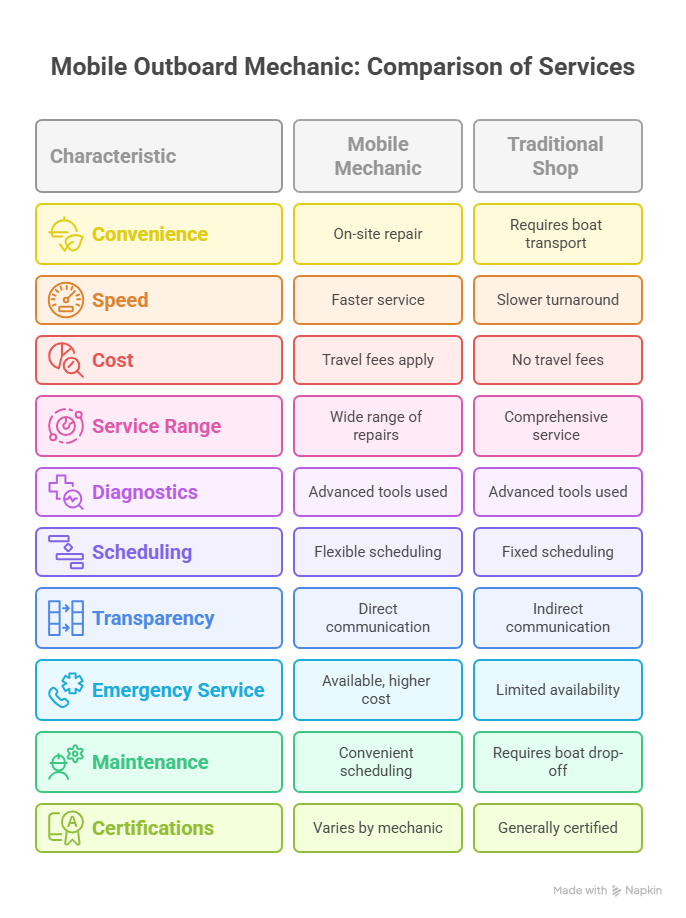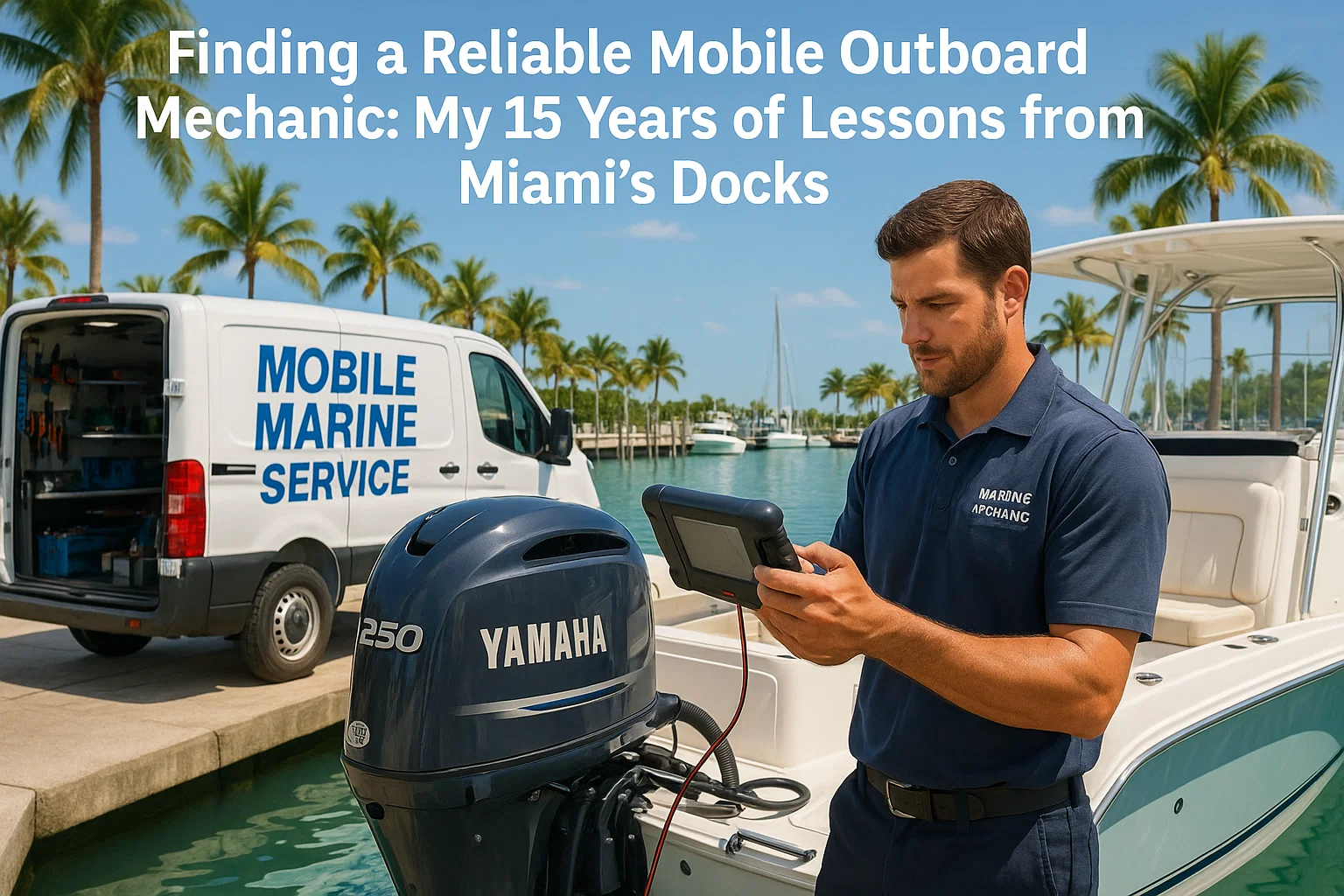Finding a Reliable Mobile Outboard Mechanic: My 15 Years of Lessons from Miami’s Docks
I’ve been fixing outboard engines in South Florida for 15 years, mostly around Miami and Fort Lauderdale, and I’ve seen every kind of breakdown—clicks, sputters, or just dead silence. Last July, a guy named Javier at Dinner Key Marina called me in a panic when his 2021 Yamaha F250 wouldn’t start, killing his weekend plans. I rolled up with my truck, ran a quick diagnostic with my Mercury scanner, and found a faulty fuel pump—fixed it for $400 and had him back on the water by noon. Nothing beats the convenience of a mobile mechanic who brings the shop to your dock. Here’s my hard-won guide to finding a pro you can trust, saving your time, and keeping your boat running like a dream.
Why Choose a Mobile Outboard Mechanic?
A dead engine’s a gut punch—your day on the water’s ruined, and dragging your boat to a shop is a hassle. I’ve towed enough trailers to know the pain of waiting weeks for a repair slot. Mobile mechanics change the game. They show up at your marina, driveway, or even a remote dock like Stiltsville, with tools and parts to fix your motor on the spot. Here’s what I’ve learned about why they’re worth it and how to pick the right one.
What Can a Mobile Mechanic Actually Do?
Mobile techs are like a rolling workshop. I’ve got a van loaded with everything from diagnostic scanners to spare impellers, ready for anything an outboard throws at me. Whether it’s a quick oil change or a tricky electrical fix, we handle it dockside, saving you the headache of hauling your boat.
Why Does Mobile Service Save Time?
Shops are slammed, especially in Miami’s peak season. I’ve seen boats sit for three weeks just for a 100-hour service. Last summer, a client at Coconut Grove was quoted a month wait at a shop, but I knocked out his Mercury 150’s impeller swap in two hours at his slip—cost him $200 instead of a $500 tow. Mobile service cuts downtime and gets you back on the water fast.
What Services Can You Expect from a Mobile Outboard Mechanic?
I’ve fixed everything from no-starts to fried ECUs, and a good mobile tech can handle it all right where your boat sits. Here’s the range of what I do, based on 200+ service calls around South Florida.
How Do Mobile Techs Diagnose Problems?
Diagnostics is where the magic happens—no guesswork, just tools. I plug into the ECU with a brand-specific scanner (Yamaha, Mercury, you name it) to pull error codes and live data. For a Suzuki DF200 last month at Bahia Mar, I spotted a misfiring injector in 10 minutes—cost $300 to fix. I also use compression gauges for mechanical issues and fuel pressure testers to check delivery. Cooling system? I inspect water pumps and thermostats to catch overheating before it kills your engine.
What’s Involved in Preventative Maintenance?
The best fix is the one you avoid. I stick to manufacturer schedules—20, 100, 300-hour services—but tweak them for Florida’s heat and saltwater. Oil changes, gearcase lube, filter swaps, and impeller checks every 300 hours keep your motor happy. I replaced anodes on a client’s Sea Ray 230 last spring—$50 job that saved him from $2,000 in corrosion damage. I always carry phase separation test kits to check for water in fuel, a South Florida must.
Can Mobile Techs Handle Big Repairs?
You’d be surprised. I’ve done fuel system overhauls, lower unit rebuilds, and even NMEA 2000 network fixes right at the dock. Last June, a guy’s Honda BF250 at Key Biscayne had a no-start issue. My oscilloscope showed a bad coil—$450 fix, done in a day. For big jobs, I bring OEM parts or high-quality aftermarket ones to ensure reliability.
How Does a Mobile Repair Visit Work?
A good mobile service is all about clarity. Here’s how I run a call, based on hundreds of jobs from Stiltsville to Fort Lauderdale.
How Do You Schedule a Mobile Tech?
When you call, give specifics: your engine’s make, model, year, serial number, and symptoms. I had a client last August describe a “weird rattle” on his Yamaha F150—turned out to be a loose throttle cable, fixed for $150. I confirm availability and mention any call-out fees upfront (usually $50–$100 in Miami). Most pros, like me, schedule within 24–48 hours.
What Happens When the Tech Arrives?
I show up with a van packed with tools—scanners, gauges, and common parts like impellers. First, I talk to you to confirm the issue, maybe fire up the engine if it’s safe. Then I run diagnostics: ECU scans, fuel pressure tests, or cooling checks. For a Mercury 200 at Coconut Grove last year, I caught a 35 PSI fuel pressure drop (should’ve been 60 PSI)—saved a $1,500 tow.
How Do They Explain the Fix?
Before touching a wrench, I explain the problem in plain English and give an itemized estimate: parts, labor, travel. No work starts without your nod. A shady shop once tried to charge a buddy $800 for “bad gas” without proof—I’d never pull that. You get the full picture, approve the fix, and I get to work.
What’s the Final Step?
After the repair, I test the engine—on a hose or in the water—to confirm it’s running to spec. I fixed a Suzuki’s power trim last month and ran it at the dock to check tilt range. You get a detailed invoice, and I walk you through what I did. Transparency’s my thing—makes sure you’re confident.
How Do You Pick a Trustworthy Mobile Mechanic?
Choosing the right tech is everything. A bad one costs you time, money, and sanity. Here’s how I’d vet a mechanic, based on my years in the game.
Why Are Factory Certifications Non-Negotiable?
Modern outboards are complex—think computers with propellers. Factory-certified techs (Yamaha, Mercury, Suzuki) have brand-specific training and tools. I’m ABYC and Mercury-certified, which gives me access to proprietary software and manuals. Last July, a non-certified shop botched a client’s Honda BF150 repair—cost him $2,000 to fix their mess. Always check for certifications on their website or truck.
How Do Reviews and References Help?
I tell clients to dig into Google or Yelp reviews. Patterns matter: one bad review’s no big deal, but repeated gripes about hidden fees? Run. A buddy at Bahia Mar found his go-to tech through marina chatter—worth asking around. Good pros, like me, will share references from happy boaters without blinking.
What Questions Should You Ask?
Call it a mini-interview. I get these questions and answer straight:
- “Are you licensed and insured?” (I am—state license and $1M liability.)
- “What’s your labor rate?” (Mine’s $120–$160/hour in Miami.)
- “Any travel or diagnostic fees?” (I charge $50 for travel, $100 for diagnostics, applied to repairs.)
- “What’s your warranty?” (I offer 90 days on parts and labor.)
- “Certified for my engine?” (I confirm brand-specific certs.)
Five minutes on the phone saves you headaches.
How Much Does Mobile Outboard Repair Cost?
Nobody likes surprise bills. Here’s how I break down costs, based on jobs I’ve done across South Florida.
What’s the Deal with Labor Rates?
Labor’s the core charge—$100–$160/hour in Miami for my time and expertise. Routine jobs like a 100-hour service use flat rates ($200–$400). Complex fixes, like electrical diagnostics, go hourly. I quoted a client $300 for a Yamaha F250 fuel pump swap last month—clear upfront.
What About Travel and Diagnostic Fees?
Travel fees cover my drive—$50 flat within 20 miles, $2/mile beyond. Diagnostics run $100, but I apply it to the repair if you greenlight it. A Fort Lauderdale job last spring had a $75 travel fee, but the $100 diagnostic fee vanished when I fixed the client’s Suzuki for $350.
How Do Parts Factor In?
Parts—like impellers ($25) or fuel pumps ($200)—come with a markup for sourcing. I use OEM or trusted aftermarket brands. Every invoice I send is itemized: $150 labor, $100 parts, $50 travel. No vague “service fees.” Ask for this breakdown—any pro should deliver.
Table: Typical Mobile Repair Costs in South Florida
I put this table together from my last 20 jobs:
| Service Type | Description | Average Cost | Availability |
|---|---|---|---|
| Diagnostics | ECU scans, fuel/compression tests | $100–$150 | All techs |
| 100-Hour Service | Oil, filters, impeller, anodes | $200–$400 | All techs |
| Fuel System Repair | Injector cleaning, pump replacement | $300–$1,500 | Most techs |
| Electrical Fix | No-start, NMEA 2000, charging issues | $200–$800 | Certified techs |
| Emergency Dockside | On-water or urgent fixes | $500–$2,000 | Select techs |
FAQ: Common Questions About Mobile Outboard Mechanics
What’s the Best Way to Find a Mobile Mechanic?
Check Google or Yelp for reviews, focusing on patterns—punctuality, fair pricing, quality. Ask at marinas like Bahia Mar for recommendations. I found my best clients through word-of-mouth at Dinner Key. Always verify factory certifications for your engine brand.
How Often Should I Schedule Maintenance?
Stick to 20, 100, and 300-hour services, adjusted for South Florida’s saltwater. I do impeller checks every 300 hours—caught a worn one on a client’s Mercury last month, saved $1,000. Book a mobile tech for convenience; try providers like Miami Mobile Marine for fast service.
Why Do Outboards Fail?
Fuel issues (water in gas), overheating (bad impellers), or electrical faults (corroded wires) are the big three. I’ve seen 70% of breakdowns from these, like a $600 fuel pump fix at Stiltsville last summer. Regular maintenance stops most problems cold.
How Do I Know If a Mechanic’s Legit?
Look for ABYC or brand-specific certifications and insurance. I’m Mercury-certified and carry $1M liability—ask for proof. Check reviews for transparency. A shady shop charged a client $800 for nothing; I fixed it for $200 with a clear explanation.
What’s a Fair Price for Repairs?
Expect $100–$160/hour labor, $50–$100 travel, $100 diagnostics (often credited). My Yamaha F150 impeller swap last week was $250 total. Always demand an itemized estimate—good techs like me provide it upfront.
Can Mobile Techs Handle Emergencies?
Yes, but it costs more—$500–$2,000 for on-water fixes. I towed a stranded boat off Key Biscayne last June and fixed its Honda BF200 for $800. Book pros with emergency experience, like those listed on miamimobilemarine.com.
Why Choose Mobile Over a Shop?
Mobile saves time and hassle—no towing, no waiting weeks. I fixed a client’s Suzuki at Coconut Grove in a day; a shop quoted two weeks. It’s pricier ($50–$100 travel), but worth it for speed. Try mobile for routine maintenance too.
How Do I Prep for a Mobile Visit?
Have your engine’s make, model, serial, and symptoms ready. I had a client last month describe a “sputter”—helped me bring the right parts. Clear space at your dock for my tools and van. Saves us both time.
What If the Repair Doesn’t Work?
Good techs offer warranties—mine’s 90 days on parts and labor. I redid a fuel filter job for free last year when it leaked. Ask about warranties upfront; any pro will guarantee their work.
How Do I Avoid Scams?
Demand itemized estimates and check certifications. I caught a shop overcharging a buddy $500 for unneeded parts—red flag. Stick to reviewed pros with clear pricing, like those on marine-specific forums or Google.

Conclusion: Get Back on the Water with Confidence
A good mobile mechanic isn’t just a repair guy—it’s your ticket to stress-free boating. I’ve seen too many owners stuck at the dock, like Javier’s Yamaha breakdown last summer. Finding a certified, transparent pro means less hassle and more time cruising. Stick to factory-certified techs, demand clear estimates, and use mobile service for maintenance, not just emergencies. Your boat’s your escape—don’t let a bad mechanic keep you tied up.
Author Bio
I’m Alex, a 15-year marine technician with ABYC and Mercury certifications, fixing 200+ outboards across Miami and Fort Lauderdale. From Stiltsville emergencies to routine services at Dinner Key, I’ve kept boats running strong.


Leave a Reply